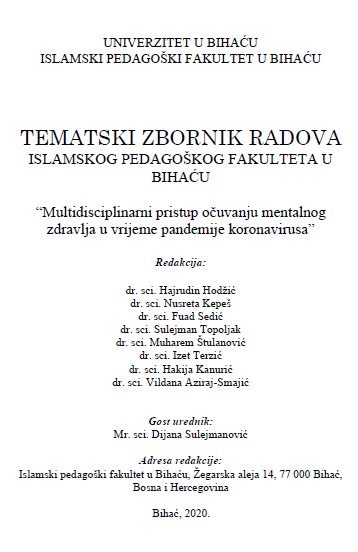PSIHA U DOBA KORONE
PSYCHE IN THE TIME OF CORONA
Author(s): Dijana SulejmanovićSubject(s): Social psychology and group interaction, Personality Psychology, Behaviorism, Health and medicine and law, Globalization
Published by: ISLAMSKI PEDAGOŠKI FAKULTET U BIHAĆU
Keywords: Psychology; COVID-19; Mental health; Social isolation; Social situation; Psychological reactions to isolation;
Summary/Abstract: Psychology, as one of the leading helping professions, has a constant obligation to explore and study a mental health, as well as everything that disturbs and endangers it, but also everything that has a protective function. The coronavirus disease 2019 (COVID-19) pandemic has become one of the central health crises of a generation. The pandemic has affected people of all nations, continents, races, and socioeconomic groups. The responses required, such as quarantining of entire communities, closing of schools, social isolation, and shelterin-place orders, have abruptly changed daily life. Such specific circumstances are interesting and attractive for research especially because of the lack of earlier empirical findings with which it is possible to compare the current state in which mankind is. Are there personality traits that will lead us to reduced social self-awareness and individuals who will not follow the rules of behavior in a specific social situation, the global pandemic? Are depressive, anxiety or stress symptoms above the usual parameters? Can a conformist orientation, a value that is characteristic of a collectivistic societies and has given a negative appearance in individualistic ones, help leaders towards long-term useful patterns of behavior? The aim of this study was to test these variables as a possible predictors of positive conformity and examine does a positive conformity might be a reason of quite a stable health situation in a undeveloped, to these challenges unprepared, country such as Bosnia and Herzegovina. Also, psychological reactions to exposure to an unknown, potentially threatening situation are determined, with an attention to finding are there some individual differences that can be viewed as predictors of responsible or irresponsible behavior in terms of compliance with measures issued by the Crisis Staff and other authorities. Research and clinical observations suggest that during times of pandemic many people exhibit stress- or anxiety-related responses. Studies have suggested that public health emergencies can have many psychological effects on college students, which can be expressed as anxiety, fear, and worry (Mei et al., 2011). Since, there are a limited number of studies regarding the psychological impacts of COVID-19 on mental health (Mamun and Griffiths 2020; Pakpour and Griffiths 2020; Schimmenti et al. 2020; Wang et al. 2020).
Journal: ZBORNIK ISLAMSKOG PEDAGOŠKOG FAKULTETA U BIHAĆU
- Issue Year: 2020
- Issue No: 12
- Page Range: 23-34
- Page Count: 12
- Language: Bosnian

